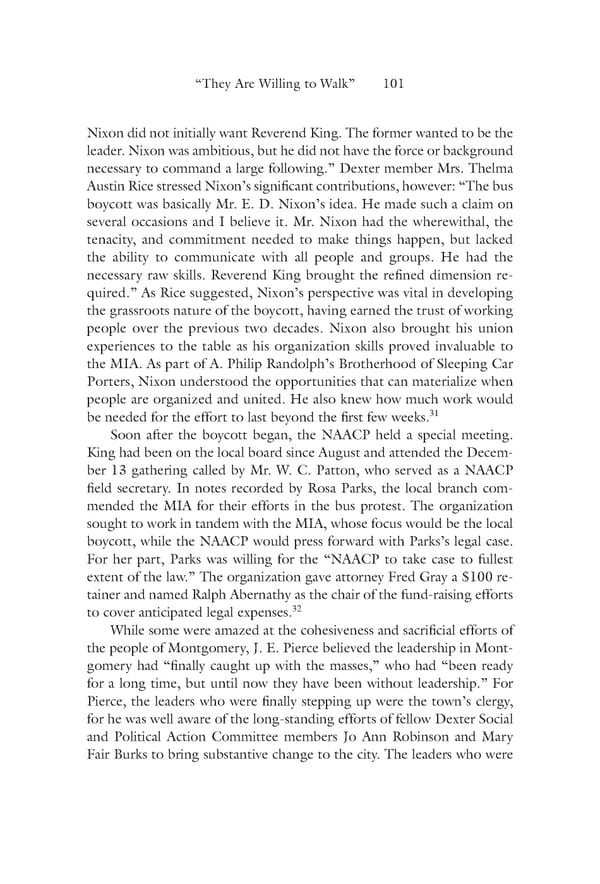“They Are Willing to Walk” 101 Nixon did not initially want Reverend King. The former wanted to be the leader. Nixon was ambitious, but he did not have the force or background necessary to command a large following.” Dexter member Mrs. Thelma Austin Rice stressed Nixon’s significant contributions, however: “The bus boycott was basically Mr. E. D. Nixon’s idea. He made such a claim on several occasions and I believe it. Mr. Nixon had the wherewithal, the tenacity, and commitment needed to make things happen, but lacked the ability to communicate with all people and groups. He had the necessary raw skills. Reverend King brought the refined dimension re- quired.” As Rice suggested, Nixon’s perspective was vital in developing the grassroots nature of the boycott, having earned the trust of working people over the previous two decades. Nixon also brought his union experiences to the table as his organization skills proved invaluable to the MIA. As part of A. Philip Randolph’s Brotherhood of Sleeping Car Porters, Nixon understood the opportunities that can materialize when people are organized and united. He also knew how much work would 31 be needed for the effort to last beyond the first few weeks. Soon after the boycott began, the NAACP held a special meeting. King had been on the local board since August and attended the Decem- ber 13 gathering called by Mr. W. C. Patton, who served as a NAACP field secretary. In notes recorded by Rosa Parks, the local branch com- mended the MIA for their efforts in the bus protest. The organization sought to work in tandem with the MIA, whose focus would be the local boycott, while the NAACP would press forward with Parks’s legal case. For her part, Parks was willing for the “NAACP to take case to fullest extent of the law.” The organization gave attorney Fred Gray a $100 re- tainer and named Ralph Abernathy as the chair of the fund-raising efforts 32 to cover anticipated legal expenses. While some were amazed at the cohesiveness and sacrificial efforts of the people of Montgomery, J. E. Pierce believed the leadership in Mont- gomery had “finally caught up with the masses,” who had “been ready for a long time, but until now they have been without leadership.” For Pierce, the leaders who were finally stepping up were the town’s clergy, for he was well aware of the long-standing efforts of fellow Dexter Social and Political Action Committee members Jo Ann Robinson and Mary Fair Burks to bring substantive change to the city. The leaders who were
 Becoming King: Martin Luther King Jr. Page 121 Page 123
Becoming King: Martin Luther King Jr. Page 121 Page 123